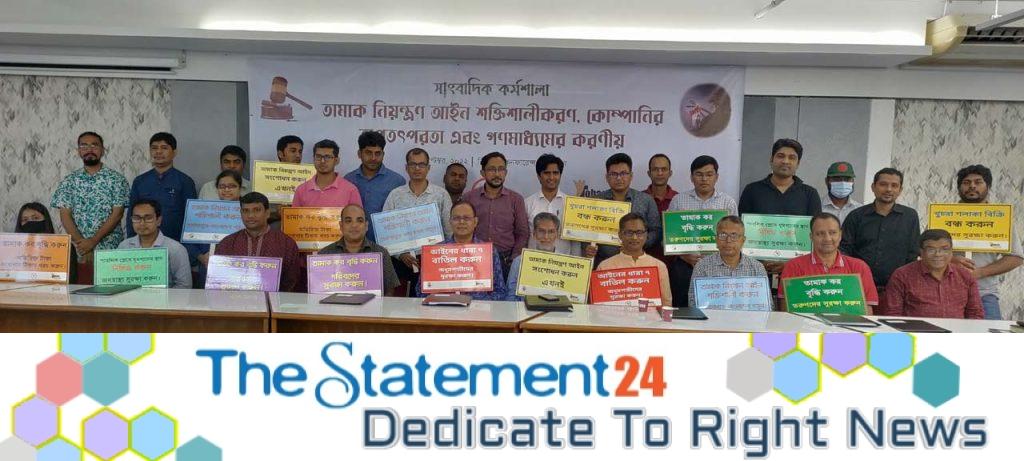
The Ministry of Health and Family Welfare (MoHFW) has recently taken an initiative to amend the tobacco control law to achieve a tobacco-free Bangladesh. The draft amendment proposals have already been prepared and published on the website. Stakeholders have also provided necessary feedback on the draft proposals. However, tobacco companies are spreading false and baseless claims to hinder this important initiative of the government. The media can play a strong role to ensure speedy finalization of the draft by providing actual information and the rationale for strengthening the law. These issues were discussed by panelists at two day-long journalist workshops titled “Strengthening of Tobacco Control Laws, Ill Tactics of Companies and the Role of Media”, held at the conference room of Bangladesh Institute of Planners (BIP) on 13 and 14 September 2022. Research and anti-tobacco advocacy organization PROGGA (Knowledge for Progress) and Anti-Tobacco Media Alliance (ATMA) organized the workshop, with support from Campaign for Tobacco-Free Kids (CTFK). The workshop was conducted with the participation of 52 journalists working in print, television and online media.
It was informed at the workshop that tobacco companies and their beneficiary groups are trying to mislead the public and policymakers by misrepresenting various clauses of the draft amendment through press conferences, policy dialogues, media campaigns, etc. Although 67 countries around the world have already abolished the scope for ‘Designated Smoking Areas’ (DSAs) and opted for complete smoke-free laws, the tobacco companies are opposing the amendment proposal on this issue. It will never be possible to protect non-smokers from second-hand smoke by maintaining DSAs. On the other hand, it is also being said that e-cigarettes are less harmful, and banning them will increase the use of conventional cigarettes, which is far from the truth. At least 32 countries, including India, have already banned all types of vaping products, including e-cigarettes, as these products are scientifically proven as harmful to public health. It was further informed at the workshop that taking advice or opinions from tobacco companies and any group related to vested commercial interest while formulating public health laws or regulations is clearly a violation of Article 5.3 of the World Health Organization’s Framework Convention on Tobacco Control – FCTC. Bangladesh is the first country to sign this international treaty.
In the closing speech, the former Vice-Chancellor of the University of Dhaka, Prof Dr. AAMS Arefin Siddique said, “This initiative of the Ministry of Health and Family Welfare (MOHFW) is commendable. I hope the government completes the amendment process of the law as soon as possible, prioritizes public health and ignore the ill tactics of tobacco companies. It is high time a strong law is passed to achieve a tobacco-free Bangladesh.”
Former President of Bangladesh Federal Union of Journalists (BFUJ) and prominent journalist Monjurul Ahsan Bulbul, Lead Policy Advisor for Campaign for Tobacco-Free Kids (CTFK)- Bangladesh Md. Mostafizur Rahman, Head of News of NTV Zahirul Alam, Senior News Editor of Channel i Mir Masrur Zaman, Convener of ATMA Liton Haider, Co-Conveners Nadira Kiron and Mizanur Chowdhury and Executive Director of PROGGA ABM Zubair were present as discussants at the workshop. PROGGA’s tobacco control Project Head Hasan Shahriar delivered the keynote presentation.
It may be mentioned that 35.3 percent of adults in Bangladesh (37.8 million) use tobacco. More than 161,000 lives are lost every year in Bangladesh due to diseases related to tobacco use. The economic loss (medical expenses and loss of productivity) of tobacco use in the fiscal year 2017-18 amounted to Tk 30,560 crore, which is much higher than the revenue earned from the tobacco sector (Tk 22,810 crore) during the same period (FY 2017-18). The Hon’ble Prime Minister Sheikh Hasina has expressed her determination to make Bangladesh tobacco-free by 2040 in order to avoid the harmful effects of tobacco.

